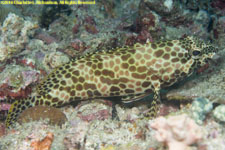 Longfin grouper, Epinephelus quoyanus
Longfin grouper, Epinephelus quoyanusWe took an underwater photography trip to the Philippines in December 2016. We returned in November 2024.
"Grouper" comes from the Portuguese "garoupa". Groupers have a stout body and a large mouth. They swallow prey rather than biting pieces off. Groupers eat fish, octopuses, and crustaceans.
 Longfin grouper, Epinephelus quoyanus
Longfin grouper, Epinephelus quoyanus
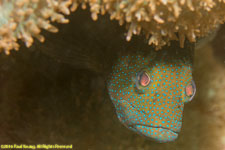 Peacock grouper (rockcod), Cephalopholis argus
Peacock grouper (rockcod), Cephalopholis argus
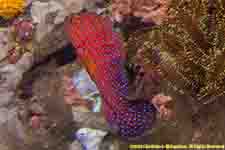 Coral grouper, Cephalopholis miniata
Coral grouper, Cephalopholis miniata
Squirrelfish are ray-finned fish. Most of them are red.
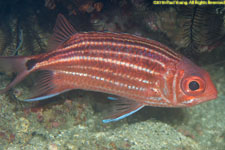 Three-spot squirrelfish, Sargocentron comutum
Three-spot squirrelfish, Sargocentron comutum
Parrotfish are found in relatively shallow tropical and subtropical oceans. Their teeth are a tightly-packed mosaic on the external surface of the jaw bones, forming a parrot-like beak with which they rasp algae from coral and other rocky substrates.
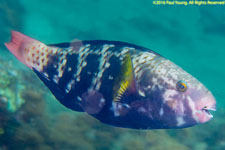 Indian parrotfish, Chlorurus captistratoides
Indian parrotfish, Chlorurus captistratoides
A trumpetfish is a long-bodied fish with an upturned mouth. Trumpetfish often swim vertically while trying to blend in with vertical coral such as sea rods, sea pens, and pipe sponges.
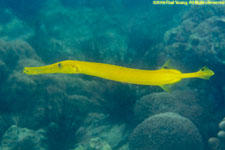
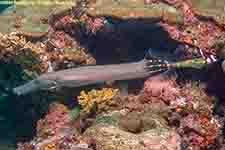 (Chinese) Trumpetfish, Autostomus chinensis
(Chinese) Trumpetfish, Autostomus chinensis
Lizardfish are bottom-dwelling marine and estuarine fish. They have slender, somewhat cylindrical bodies with heads that superficially resembled those of lizards. They prefer sandy environments.
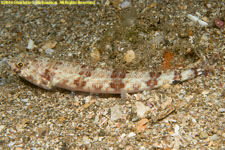 Redmarbled lizardfish, Synodus rubromamoratus
Redmarbled lizardfish, Synodus rubromamoratus
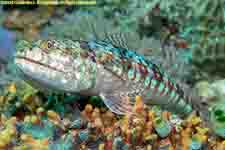 Blackblotch lizardfish, Synodus jaculum
Blackblotch lizardfish, Synodus jaculum
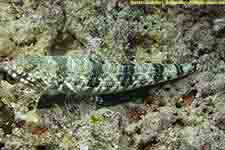 Clearfin (Grey-streak) lizardfish, Synodus dermatogenys
Clearfin (Grey-streak) lizardfish, Synodus dermatogenys
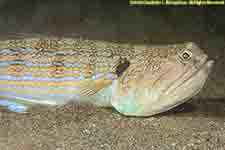
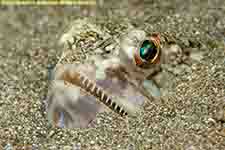 Bluntnose lizardfish, Trachinocephalus trachinus
Bluntnose lizardfish, Trachinocephalus trachinus
Bigeyes have unusually large eyes. They are nocturnal carnivores.
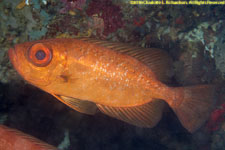 Bloch's bigeye, Priacanthus blochii
Bloch's bigeye, Priacanthus blochii
Snappers are active carnivores, feeding on crustaceans and other fish.
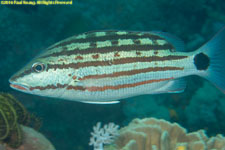
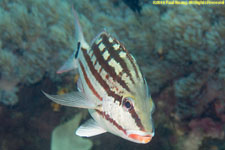 Checkered snapper, Lutjanus decussatus
Checkered snapper, Lutjanus decussatus
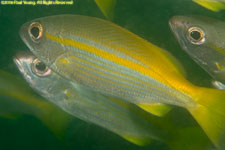 Bigeye snapper, Lutjanus lutjanus
Bigeye snapper, Lutjanus lutjanus
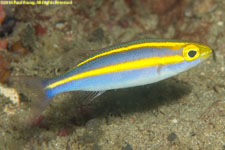 Juvenile yellow-striped whiptail, Pentapodus aureofasciatus
Juvenile yellow-striped whiptail, Pentapodus aureofasciatus
Breams are narrow, deep-bodied fish.
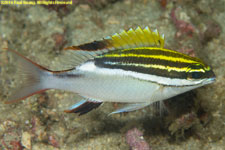 Bridled monocle bream, Scolopsis temporalis
Bridled monocle bream, Scolopsis temporalis
Dragonets are generally very colorful small marine fish with cryptic patterns. Their bodies are elongated and scaleless. A large preopercular spine is characteristic of this fish, and has been reported to be venomous in some species. All fins are large, showy and elongated; the first high dorsal fin usually has four spines; in males, the first of these spines may be further adorned with filamentous extensions.
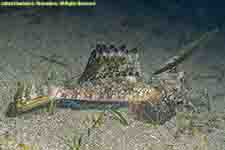 Fingered dragonet, Dactlylopus dactylopus
Fingered dragonet, Dactlylopus dactylopus
Stingrays are cartilaginous fish:
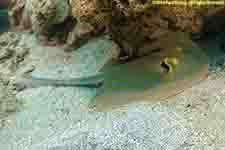 Blue-spotted ribbontail (fantail) ray, Taeniura lymna
Blue-spotted ribbontail (fantail) ray, Taeniura lymna
 Razorfish (Coral shrimpfish), Aeoliscus strigatus
Razorfish (Coral shrimpfish), Aeoliscus strigatus
The Moorish idol is the only extant member of its family and genus.

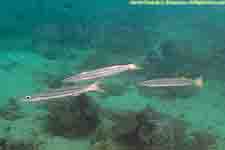 Yellowtail barracuda, Sphyraena flavicauda
Yellowtail barracuda, Sphyraena flavicauda
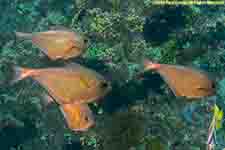 Vanikoro sweeper (Greenback bullseye), Pempheris vanikokensis
Vanikoro sweeper (Greenback bullseye), Pempheris vanikokensis
 Leopard flounder, Bothus punthenrius
Leopard flounder, Bothus punthenrius
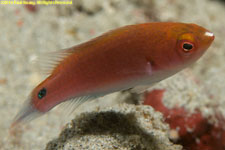 Katherine's wrasse, Cirrhilabrus katherinae
Katherine's wrasse, Cirrhilabrus katherinae
©2016, 2017, 2024, 2025 Mermaid Underwater Photographic. All Rights Reserved.
Contact us at mermaid@underwater.org.
Last modified 11 December 2025